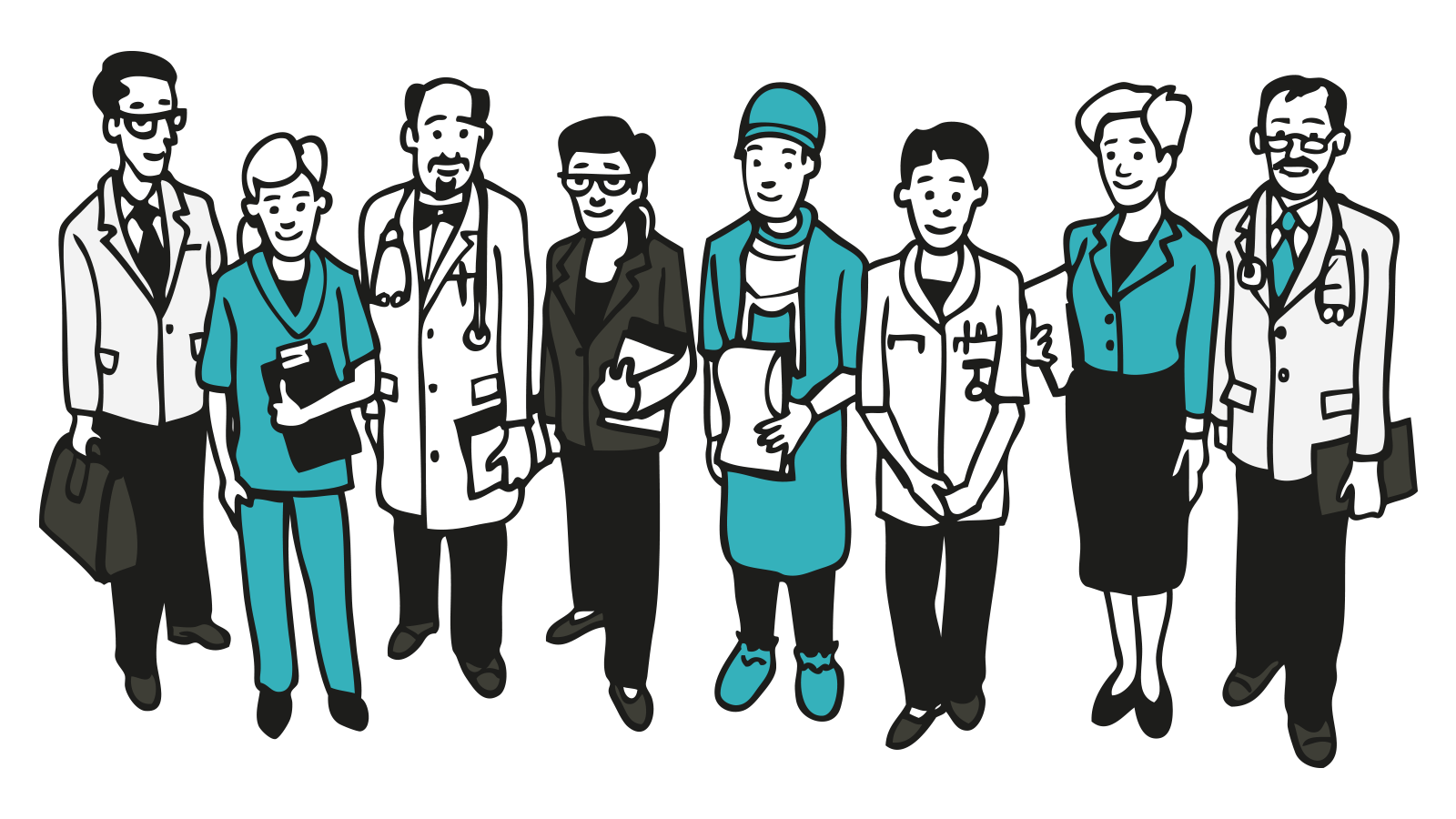Your healthcare team is there to guide and support you through your journey with XLH. This article explains the different roles of the professionals you may meet.
Your healthcare team

As there’s no fixed pattern of treatment for XLH, everyone’s journey will be different. It depends on your individual circumstances, and how the healthcare system is organised where you live.
If you're being investigated or treated for XLH you can expect to meet a lot of people working in healthcare. At times, it can be hard to see how they all fit into the bigger picture.
The exchange of information between doctor and patient is central to good decision-making, so feel comfortable to ask your healthcare team questions. It is your healthcare team’s responsibility to explain your health plan and treatment options available, including the option to seek a second opinion.
Some of the healthcare professionals you may meet are listed below.
Doctors, Dentists, Nurses and Pharmacists
General practitioner or family doctor
Your GP or local family doctor will normally be the first step on your journey. He or she will be able to discuss your concerns, assess your situation, and request suitable tests or treatment. If you need specialist attention your family doctor will refer you to a clinic or hospital department.
Although your doctor should be aware of your family background, because XLH is so rare, many doctors will not have seen it before. It’s a good idea to jot down some questions, or bring along our diagnosis checklist before arranging an appointment to help you get the most out of your time.
Endocrinologist
An endocrinologist is a specialist doctor who can investigate, diagnose and treat disorders of the endocrine, or hormonal system, which is partly responsible for healthy growth and development. Some endocrinologists will have a special interest in metabolic bone diseases such as XLH.
Nephrologist
A nephrologist is a renal specialist, or kidney doctor, who diagnoses and treats diseases of the kidneys. They take care of patients with a wide variety of conditions affecting the kidneys including inherited diseases.
They will look at how your kidneys are functioning and carry out tests on phosphate levels. They will be able to monitor and assess whether treatment is resulting in nephrocalcinosis, a build-up of calcium in the kidney that can impair its function.
A nephrologist will be an important part of the team looking after people with conditions such as XLH. Some may have had specialist experience of XLH and it’s worth finding one who knows about it.
Dentist
A dentist can help prevent or treat tooth and gum symptoms caused by XLH, as well as provide general dental care. It is important to tell your family dentist about your XLH from early on, so that they can pay special attention to your teeth and gum health. This may include taking regular X-rays to help spot problems early before they develop. They can also make a referral to a specialist dentist for advanced dental treatment if necessary.
It can be helpful for all the specialists involved in your care to be connected with each other, including your dentist, so that they can share knowledge and information about your symptoms and treatment plan. A way to begin this connection might be to ask your specialist doctor to write a letter to your dentist, explaining how your condition may affect your teeth. To find out more about how XLH can affect teeth and gums please visit our Dental section.
Orthopaedic surgeon – adult and paediatric
Paediatric and adult Orthopaedic surgeons treat problems that affect the muscles, joints, bones, ligaments, tendons and nerves. If surgery is requried, they can offer the best advice.
A pediatric or adult surgeon should be part of the team looking after you and should be able to offer advice on surgery to correct bowed or twisted bones in children and adults. They can advise on which surgery is right for adults.
Rheumatologist
Rheumatologists are specialist doctors who treat conditions that affect the joints, bones, muscles and soft tissues.
As many of the signs and symptoms of XLH can be found in other musculoskeletal disorders, you may be seen by a rheumatologist who has some background or understanding of rare skeletal disease and XLH in particular.
Geneticist
This is an ever-developing area of science/medicine but may only be available in larger hospitals. Clinical geneticists can advise on genetic testing and discuss options for people with inherited conditions, such as XLH, who want to start a family and are concerned about passing on a condition to the next generation.
Pain specialist
Pain management specialists are hospital doctors who specialize in treating people who are experiencing persistent or long-term pain as a result of injury, surgery or a physical illness or disorder.
Your pain specialist identifies possible causes of your pain and advises on the best therapies. They can prescribe medication and monitor and adjust the effectiveness of prescribed drugs.
They're also able to recommend non-medical therapies such as hypnotherapy, gels, hot and cold packs and TENS machines, which are battery-operated, nerve stimulation machines, used to treat a variety of painful conditions.
Regular visits to the pain clinic and re-assessment may be needed to help you get your pain under control.
Nurse
Nurses work at the center of teams across many different specialties. In larger areas, they may work exclusively in either adult or children’s medicine. They are often the people you will see the most in a hospital or clinical setting and fulfil many roles.
They will be able to observe and assess people, and plan and deliver care to a wide range of patients as well as monitoring and evaluating how successful it has been. Nurses act as intermediaries between patients, family doctors and specialists and can also offer emotional support and advice to patients and their families and carers.
Pharmacist
Pharmacists work in hospitals or community pharmacies, and in some areas can be found in retail stores. Your community pharmacist can be a good source of information on prescribed medicines.
Allied Health Professions
Allied health professions are health care professions distinct from nursing, medicine, dentistry and pharmacy. They work in health care teams to make the health care system function by providing a range of diagnostic, technical, therapeutic and direct patient care and support services that are critical to the other health professionals they work with and the patients they serve.
Physiotherapists
Physiotherapists see a wide range of people with problems that affect their movement. Their aim is to help people to be as active as possible and move as well as they can.
For people with XLH, it's important to see a physiotherapist who specializes in musculoskeletal disorders. You should see your family doctor or specialist for referral to one who has the right expertise and experience for you.
Orthotist
Sometimes known as a prosthetist, an orthotist specializes in the design of devices to correct deformities, support weak joints and reduce the daily wear and tear on the skeleton.
He or she will work with you to assess your needs and design and fit bespoke splints, braces, special footwear or aids to improve movement, correct any deformity and relieve discomfort.
You may need to visit the orthotist several times to adjust and assess if the devices they have made for you are suitable and effective.
Occupational therapist
Your occupational therapist can help if you are struggling to carry out essential everyday activities due to a health condition or physical restriction. They can help find practical solutions to everyday problems and advise on how to approach things differently.
They may be able to help people with reduced mobility or dexterity to achieve goals using technology or equipment. They can also advise on adapting working or living spaces to make things easier.
Counselor
Counselors may be available in larger hospitals and medical centers to help people deal with the emotional impact of health conditions on themselves and their family. Some may already have a clinical qualification, or may have qualified as a counselor, outside the health service.
Whatever their background may be, their role is to provide support for families of children and individuals and to help them understand and deal with a variety of anxieties and health concerns and disorders.
Genetic counselors have the specialist role of advising on all aspects of genetic disorders and conditions. They may be based in larger regional centers.







